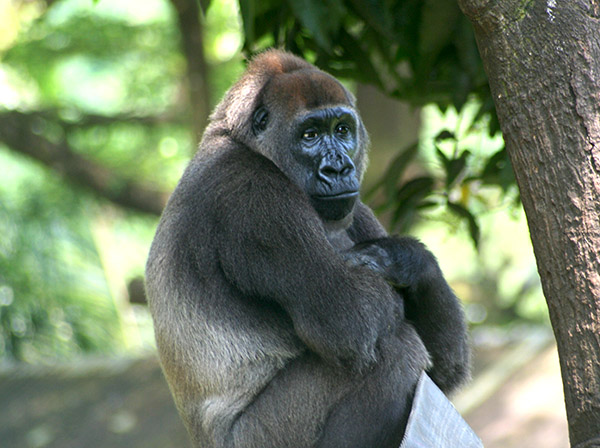- Blog
- Sustainable Economic Systems
- Subsistence farmers and great apes on alert: the African palm oil frontier continues to grow
Subsistence farmers and great apes on alert: the African palm oil frontier continues to grow

Donate Now!
Your contribution will benefit Friends of the Earth.
Stay Informed
Thanks for your interest in Friends of the Earth. You can find information about us and get in touch the following ways:
Earlier this month, Liberian peasant farmer and activist Elder Chio Johnson stood frustrated before the locked iron gates enclosing the regional offices of two big palm oil companies, Equatorial Palm Oil and Kuala Lumpur Kepong Berhad, in Grand Bassa County, Liberia.
“They refuse to talk to us about our land business. Are we not people?” he asked.
Along with many members of his clan, Johnson had come to deliver 90,000 signatures — many collected by Friends of the Earth — to the British and Malaysian joint palm oil venture to tell them to stop taking the community’s land. But the companies refused to meet.
This was only the latest insult to the Jogbahn clan in an ongoing palm oil saga, as The Ecologist recently reported.
Despite having voiced support for the Jogbahn Clan’s land claims earlier this year, Liberian President Ellen Sirleaf Johnson then changed her tone by characterizing community resistance as “harassment of investors” that undermines the country’s economic growth.
Like leaders of most so-called “developing nations,” the Liberian president’s priority is not human rights or protecting biodiversity, but attracting foreign direct investment in agriculture. While economic development is of course crucial, prioritizing foreign investment in large-scale agricultural production ignores evidence that food produced through monocrop agriculture in countries like Liberia is typically exported, leaving these countries facing high levels of malnourishment.
Even as Indonesia is declared the world’s leader in forest destruction due to palm oil expansion, Africa’s stake in palm oil is growing — and putting both communities and biodiversity at risk. A new study shows that most of the lands slated for palm oil development across West and Central Africa are home to Africa’s last great apes.
The study, published in in Current Biology this week, is tellingly entitled “Will Oil Palm’s Homecoming Spell Doom for Africa’s Great Apes?” As the most up-to-date research on the impacts of oil palm expansion on wildlife in Africa, the study raises the alarm that the same industry that is devastating orangutans in Borneo is putting bonobo monkeys, chimpanzees and gorillas at risk across the African rain forest belt.
In Nigeria, where Friends of the Earth Nigeria and Rainforest Resources Development Center are facing off in court against Wilmar, it’s the Cross River gorilla that’s at risk. Called the least known and most threatened ape in Africa, with only 250 or so individuals remaining, these apes live in Cross River National Park on the border of Nigeria and Cameroon — precisely where Wilmar Group is developing upwards of 50,000 acres of palm plantations. According to RRDC, some of these plantations adjoin and even overlap the national park itself.
Cross River National Park is also home to other endemic primate species including the endangered Preuss Red Colobus and the Drill. Lars Gorschlueter of the Save Wildlife Conservation Fund which works in the region, said ”If this industrial plantation is allowed into the Reserve, it will effectively box in wildlife and our research has shown that wildlife cannot survive in an environment like this.”
As usual, it is not just wildlife that is threatened, but people’s livelihoods. In RRDC’s complaint to the Roundtable on Sustainable Palm Oil, the group argues that “More than eighty percent of the lands [under development for palm oil] will include community forest and farmlands of indigenous communities which have never been cultivated as oil palm plantations. There is therefore no way,” RRDC says, “that Wilmar International will be able to develop oil palm plantations without massive destruction of forest.”
Oil palms are native to West Africa, where, grown on a limited scale in mixed agro-ecosystems, they’ve provided a traditional food for millennia. But they grow better in Southeast Asian climates, one of the authors of the new study on great apes told NPR last week — so palm oil companies that are moving to Africa have to use more land to keep up with the high yields of Asian plantations.
This means that, even as dozens of food companies commit to “No Deforestation” policies, the resistance from communities we’re currently seeing in Liberia, Nigeria and Uganda will likely continue to grow.
Image credit: Julie Langford, limbewildlife.org, Creative Commons
